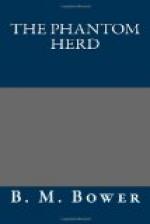“What they doing? Still riding?” Luck let out a long breath and lighted his cigarette. A little flare of hope had come into his eyes.
“Riding—yes, what little there is to do. Ranching a little too, and kicking about changed times, same as I’m doing. Last time I saw that outfit they was riding, you bet!” The dried little man chuckled, “That was in Great Falls, some time back. They was all in a contest, and pulling down the money, too. I was talking to old man Whitmore all one evening. He was telling me—”
From away out yonder behind a hill came the throaty call of the coming train. The dried little man jumped up, mumbled that it did beat all how time went when yuh got to talking over old days, and hustled two trunks out of the baggage room. Luck got his grip out of the office, settled himself into his coat, and took a last, long pull at the cigarette stub before he threw it away. It was not much of a clue that he had fallen upon by chance, but Luck was not one to wait until he was slapped in the face with a fact. He had intended swinging back through Arizona, where in certain parts cattle still were wild enough to bunch up at sight of a man afoot. His questioning of the dried little man had not been born of any concrete purpose, but of the range man’s plaint in the abstract. Still—
“Say, brother, what’s the Flying U’s home town?” he called after the dried little man with his amiable, Southern drawl.
“Huh? Dry Lake. Yuh taking this train?”
“So long—taking it for a ways, yes.” Luck hurried down to where a kinky-haired porter stood apathetically beside the steps of his coach. Dry Lake? He had never heard of the place, but he could find out from the railroad map or the conductor. He swung his grip into the waiting hand of the porter and went up the steps hurriedly. He meant to find out where Dry Lake was, and whether this train would take him there.
CHAPTER TWO
“Where the cattle roamed in thousands, A-many A herd and brand ...”—Old Range Song.
If you are at all curious over the name to which Luck Lindsay answered unhesitatingly,—his very acceptance of it proving his willingness to be so identified,—I can easily explain. Some nicknames have their origin in mystery; there was no mystery at all surrounding the name men had bestowed upon Lucas Justin Lindsay. In the first place, his legal cognomen being a mere pandering to the vanity of two grandfathers who had no love for each other and so must both be mollified, never had appealed to Luck or to any of his friends. Luck would have been grateful for any nickname that would have wiped Lucas Justin from the minds of men. But the real reason was a quirk in Luck’s philosophy of life. Anything that he greatly desired to see accomplished, he professed to leave to chance. He would smile his smile, and lift his shoulders in the Spanish way he had learned in Mexico and the Philippines, and say: “That’s as luck will have it. Quien sabe?” Then he would straightway go about bringing the thing to pass by his own dogged efforts. Men fell into the habit of calling him Luck, and they forgot that he had any other name; so there you have it, straight and easily understandable.




